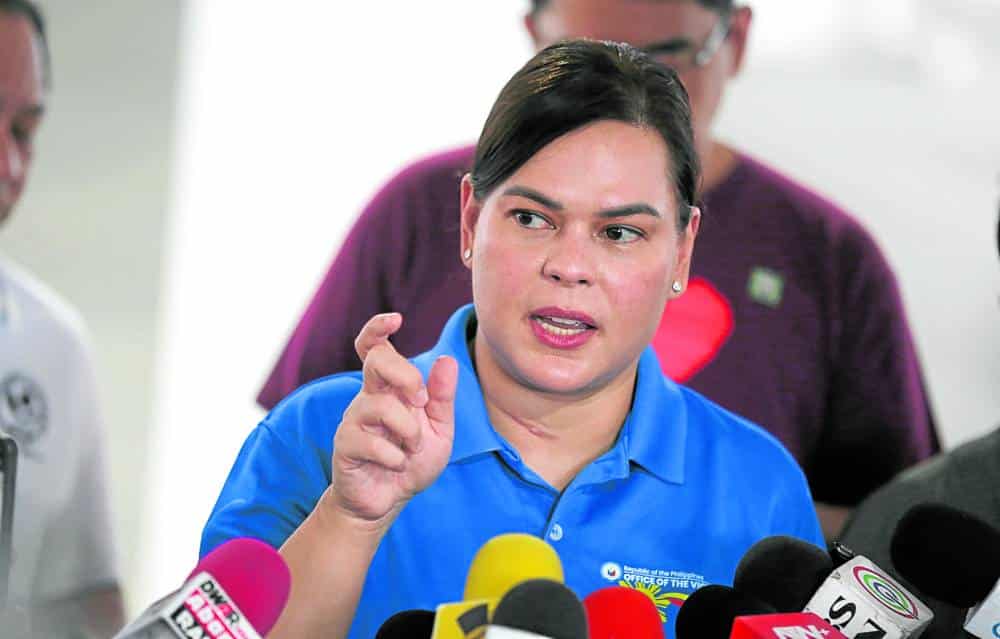
Vice President Sara Duterte FILE PHOTO
MANILA, Philippines — With an impeachment complaint already filed against Vice President Sara Duterte before the House of Representatives, what will happen next?
According to House Secretary General Reginald Velasco, they will have to see if any complaint will be endorsed by a House member, and if it is a legitimate complaint.
“Well, ‘pag nag-file, titignan natin kung kumpleto ‘no, kailangan kasi may endorsement ng House member. Tapos titignan din natin kung ‘yong complaint ay may laman ‘no, ‘di naman pwedeng impeachment complaint lang,” Velasco said in an interview with reporters on Monday, hours before civil society groups filed a complaint against Duterte.
(Well, if someone files, we will check if it is complete, because there has to be an endorsement of a House member. Then we would look if the complaint has sufficient content, it cannot be a mere complaint.)
“Pag-aaralan muna ng office ko kung tunay talagang complaint ‘yon, in form and in substance. Sa amin pa lang, initial assessment ‘yon. And then ifo-forward ko ‘yon kay Speaker, then si Speaker, supposed to forward it to the committee on rules. And then the committee on rules will refer it to the plenary ‘no, for formal referral with the justice committee,” he added.
“My office will study if it is a true complaint, in form and in substance. With us, it is an initial assessment. I would then forward that to the Speaker, then the Speaker is supposed to forward it to the committee on rules. And then the committee on rules will refer it to the plenary ‘no, for formal referral with the justice committee,” he added.
According to Velasco, he and House Speaker Ferdinand Martin Romualdez have 10 session days to act on the impeachment complaint, before it is forwarded to the House committee on rules, which will then refer it to the committee on justice during a plenary session.
But as of now, Velasco said he and Romualdez only have nine session days left, as the session would adjourn by December 18.
“Well I have 10 days and the Speaker, we have 10 days to act on it, 10 session days. So ‘pag finile na ‘yon, kulang na (So if it is filed now, we will lack days). Kasi bale nine session days na lang eh (Because we only have nine session days),” he noted.
The two committees will each have 60 days to deliberate the complaint — making the impeachment proceeding at least 130 days long.
“All in all, there are 130 days for this process. That’s days only, but there are some that are session days. So that’s what any impeachment complaint would face,” Velasco noted.
Velasco’s statements were hinged on Article XI of the 1987 Constitution, which talks about the accountability of public officials.
Section 2 of the Article XI provides that the only mode of removing a sitting President, Vice President, Supreme Court justices, members of Constitutional Commissions, and the Ombudsman is through impeachment.
The same section provides the following grounds for impeachment:
- Culpable violation of the Constitution
- Treason
- Bribery
- Graft and corruption
- Other high crimes
- Betrayal of public trust
The House meanwhile has “exclusive power to initiate” an impeachment case.
“A verified complaint for impeachment may be filed by any Member of the House of Representatives or by any citizen upon a resolution or endorsement by any Member thereof, which shall be included in the Order of Business within ten session days, and referred to the proper Committee within three session days thereafter,” Section 3, Paragraph (2) of the 1987 Constitution states.
“The Committee, after hearing, and by a majority vote of all its Members, shall submit its report to the House within sixty session days from such referral, together with the corresponding resolution. The resolution shall be calendared for consideration by the House within ten session days from receipt thereof,” the same paragraph also states.
A one-thirds vote of all House members is needed to either affirm an impeachment complaint, or override a resolution.
Section 3 also states that a verified complaint can proceed to a Senate trial immediately if it is filed “by at least one-third of all the Members of the House.”
Currently, with 307 members, a one-thirds vote in the House equates to 103 lawmakers.
Hours after the interview with Velasco, civil society groups’ representatives flocked to the House to file the impeachment complaint against Duterte. They were accompanied by former senator Leila de Lima and former Quezon City lawmaker Jose Christopher Belmonte.
The complaint was endorsed by Akbayan party-list Rep. Percival Cendaña.
READ: First impeachment complaint vs VP Sara filed at House
In a briefing before the filing, de Lima explained that among the articles of impeachment cited were Duterte’s alleged confidential fund (CF) misuse, threats to ranking government officials, and her supposed involvement in extrajudicial killings when she was Davao City mayor.
READ: Sara Duterte’s kill remark vs Marcos is ‘active threat’ – Palace
The CF issues that de Lima was referring to are the discoveries made by the House committee on good government and public accountability, like the admission from OVP and DepEd’s special disbursing officers that they left the disbursement of secret funds to security officers.
READ: Solon: SDO’s move to give up fund release role may lead to malversation
Duterte’s threats, meanwhile, refer to the Vice President’s rants in an online press briefing last November 23 where she said that she talked to someone about killing President Ferdinand Marcos Jr., First Lady Liza Araneta Marcos, and House Speaker Ferdinand Martin Romualdez, in case she gets assassinated.